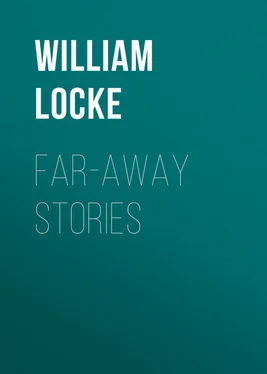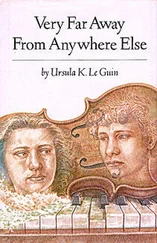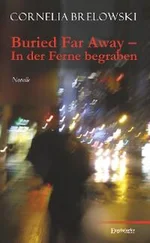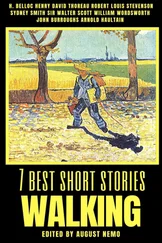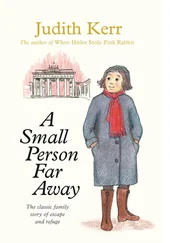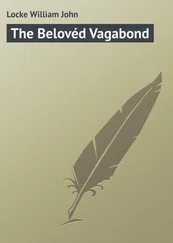William Locke - Far-away Stories
Здесь есть возможность читать онлайн «William Locke - Far-away Stories» — ознакомительный отрывок электронной книги совершенно бесплатно, а после прочтения отрывка купить полную версию. В некоторых случаях можно слушать аудио, скачать через торрент в формате fb2 и присутствует краткое содержание. ISBN: , Жанр: foreign_prose, на английском языке. Описание произведения, (предисловие) а так же отзывы посетителей доступны на портале библиотеки ЛибКат.
- Название:Far-away Stories
- Автор:
- Жанр:
- Год:неизвестен
- ISBN:http://www.gutenberg.org/ebooks/50479
- Рейтинг книги:3 / 5. Голосов: 1
-
Избранное:Добавить в избранное
- Отзывы:
-
Ваша оценка:
- 60
- 1
- 2
- 3
- 4
- 5
Far-away Stories: краткое содержание, описание и аннотация
Предлагаем к чтению аннотацию, описание, краткое содержание или предисловие (зависит от того, что написал сам автор книги «Far-away Stories»). Если вы не нашли необходимую информацию о книге — напишите в комментариях, мы постараемся отыскать её.
Far-away Stories — читать онлайн ознакомительный отрывок
Ниже представлен текст книги, разбитый по страницам. Система сохранения места последней прочитанной страницы, позволяет с удобством читать онлайн бесплатно книгу «Far-away Stories», без необходимости каждый раз заново искать на чём Вы остановились. Поставьте закладку, и сможете в любой момент перейти на страницу, на которой закончили чтение.
Интервал:
Закладка:
Miss Ursula grew downcast for a moment; then she brightened. A brilliant idea occurred to her.
"Adam Penruddocke. He has a fiddle. We can ask him to come up after tea and play to us."
She reassured Andrea in her queer sign-language, and later in the afternoon Adam Penruddocke, a sheepish giant of a fisherman, was shown into the room. He bowed to the ladies, shook the long white hand proffered him by the beautiful youth, tuned up, and played "The Carnival of Venice" from start to finish. Andrea regarded him with mischievous, laughing eyes, and at the end he applauded vigorously.
Miss Widdington turned to her sister.
"I knew he liked music," she said.
"Shall I play something else, sir?" asked Penruddocke.
Andrea, guessing his meaning, beckoned him to approach the bed, and took the violin and bow from his hands. He looked at the instrument critically, smiled to himself, tuned it afresh, and with an air of intense happiness drew the bow across the strings.
"Why, he can play it!" cried Miss Ursula.
Andrea laughed and nodded, and played a bit of "The Carnival of Venice" as it ought to be played, with gaiety and mischief. Then he broke off, and after two or three tearing chords that made his hearers start, plunged into a wild czardas. The ladies looked at him in open-mouthed astonishment as the mad music such as they had never heard in their lives before filled the little room with its riot and devilry. Penruddocke stood and panted, his eyes staring out of his head. When Andrea had finished there was a bewildered silence. He nodded pleasantly at his audience, delighted at the effect he had produced. Then, with an artist's malice, he went to the other extreme of emotion. He played a sobbing folk-song, rending the heart with cries of woe and desolation and broken hopes. It clutched at the heart-strings, turning them into vibrating chords; it pierced the soul with its poignant despair; it ended in a long-drawn-out note high up in the treble, whose pain became intolerable; and the end was greeted with a sharp gasp of relief. The white lips of the ruddy giant quivered. Tears streamed down the cheeks of Miss Widdington and Miss Ursula. Again there was silence, but this time it was broken by a clear, shrill voice outside.
"Encore! Encore!"
The sisters looked at one another. Who had dared intrude at such a moment? Miss Widdington went to the window to see.
In the garden stood a young woman of independent bearing, with a pallette and brushes in her hand. An easel was pitched a few yards beyond the gate. Miss Widdington regarded this young woman with marked disfavour. The girl calmly raised her eyes.
"I apologise for trespassing like this," she said, "but I simply couldn't resist coming nearer to this marvellous violin-playing – and my exclamation came out almost unconsciously."
"You are quite welcome to listen," said Miss Widdington stiffly.
"May I ask who is playing it?"
Miss Widdington almost gasped at the girl's impertinence. The latter laughed frankly.
"I ask because it seems as if it could only be one of the big, well-known people."
"It's a young friend who is staying with us," said Miss Widdington.
"I beg your pardon," said the girl. "But, you see my brother is Boris Danilof, the violinist, so I've that excuse for being interested."
"I don't think Mr. Andrea can play any more to-day," said Miss Ursula from her seat by the bed. "He's tired."
Miss Widdington repeated this information to Miss Danilof, who bade her good afternoon and withdrew to her easel.
"A most forward, objectionable girl," exclaimed Miss Widdington. "And who is Boris Danilof, I should like to know?"
If she had but understood German, Andrea could have told her. He caught at the name of the world-famous violinist and bent eagerly forward in great excitement.
"Boris Danilof? Ist er unten ?"
" Nicht – I mean Nein ," replied Miss Widdington, proud at not having to consult Otto.
Andrea sank back disappointed, on his pillow.
However much Miss Widdington disapproved of the young woman, and however little the sisters knew of Boris Danilof, it was obvious that they were harbouring a remarkable violinist. That even the bullet-headed doctor, who had played the double bass in his Hospital Orchestral Society and was, therefore, an authority, freely admitted. It gave the romantic youth a new and somewhat awe-inspiring value in the eyes of the ladies. He was a genius, said Miss Ursula – and her imagination became touched by the magic of the word. As he grew stronger he played more. His fame spread through the village and he gave recitals to crowded audiences – as many fisher-folk as could be squeezed into the little bedroom, and more standing in the garden below. Miss Danilof did not come again. The ladies learned that she was staying in the next village, Polwern, two or three miles off. In their joy at Andrea's recovery they forgot her existence.
Happy days came when he could rise from bed and hobble about on a crutch, attired in the quaint garments of Captain Widdington, R.N., who had died twenty years before, at the age of seventy-three. They added to his romantic appearance, giving him the air of the jeune premier in costume drama. There was a blue waistcoat with gilt buttons, calculated to win any feminine approval. The ladies admired him vastly. Conversation was still difficult, as Miss Ursula had succeeded in teaching him very little English, and Miss Widdington, after a desperate grapple with Otto on her own account, had given up the German language in despair. But what matters the tongue when the heart speaks? And the hearts of Miss Widdington and Miss Ursula spoke; delicately, timidly, tremulously, in the whisper of an evening breeze, in undertones, it is true – yet they spoke all the same. The first walks on the heather of their cliff in the pure spring sunshine were rare joys. As they had done with their watches by his bedside, they took it in turns to walk with him; and each in her turn of solitude felt little pricklings of jealousy. But as each had instituted with him her own particular dainty relations and confidences – Miss Widdington more maternal, Miss Ursula more sisterly – to which his artistic nature responded involuntarily, each felt sure that she was the one who had gained his especial affection.
Thus they wove their gossamer webs of romance in the secret recess of their souls. What they hoped for was as dim and vague as their concept of heaven, and as pure. They looked only at the near future – a circle of light encompassed by mists; but in the circle stood ever the beloved figure. They could not imagine him out of it. He would stay with them, irradiating their lives with his youth and his gaiety, playing to them his divine music, kissing their hands, until he grew quite strong and well again. And that was a long, long way off. Meanwhile life was a perpetual spring. Why should it ever end?
One afternoon they sat in the sunny garden, the ladies busy with needlework, and Andrea playing snatches of dreamy things on the violin. The dainty remains of tea stood on a table, and the young man's crutch rested against it. Presently he began to play Tschaikowsky's "Chanson Triste." Miss Ursula, looking up, saw a girl of plain face and independent bearing standing by the gate.
"Who is that, Janet?" she whispered.
Miss Janet glanced round.
"It is the impertinent young woman who was listening the other day."
Andrea followed their glances, and, perceiving a third listener, half consciously played to her. When the piece was finished the girl slowly walked away.
"I know it's wrong and unchristianlike," said Miss Widdington, "but I dislike that girl intensely."
"So do I," said Miss Ursula. Then she laughed. "She looks like the wicked fairy in a story-book."
Читать дальшеИнтервал:
Закладка:
Похожие книги на «Far-away Stories»
Представляем Вашему вниманию похожие книги на «Far-away Stories» списком для выбора. Мы отобрали схожую по названию и смыслу литературу в надежде предоставить читателям больше вариантов отыскать новые, интересные, ещё непрочитанные произведения.
Обсуждение, отзывы о книге «Far-away Stories» и просто собственные мнения читателей. Оставьте ваши комментарии, напишите, что Вы думаете о произведении, его смысле или главных героях. Укажите что конкретно понравилось, а что нет, и почему Вы так считаете.
